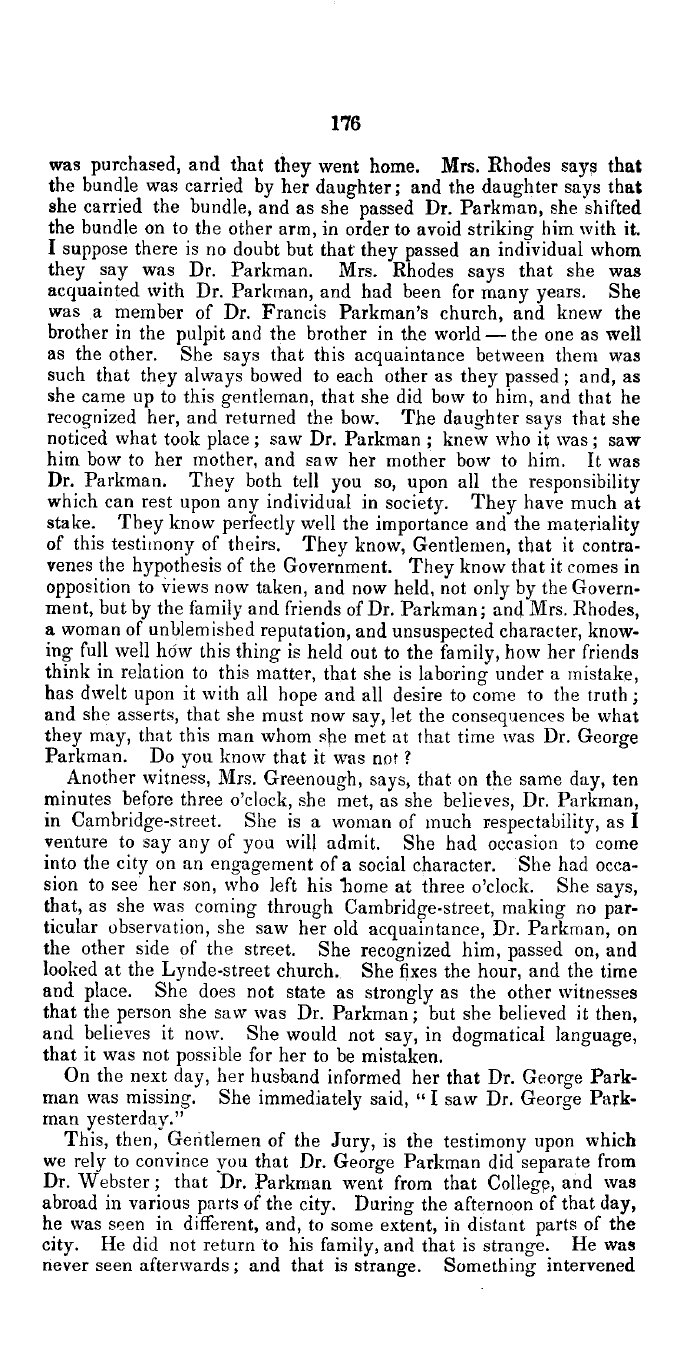|
176
was purchased, and that they went home. Mrs. Rhodes says that
the bundle was carried by her daughter; and the daughter says that
she carried the bundle, and as she passed Dr. Parkman, she shifted
the bundle on to the other arm, in order to avoid striking him with it.
I suppose there is no doubt but that they passed an individual whom
they say was Dr. Parkman. Mrs. Rhodes says that she was
acquainted with Dr. Parkman, and had been for many years. She
was a member of Dr. Francis Parkman's church, and knew the
brother in the pulpit and the brother in the world-the one as well
as the other. She says that this acquaintance between them was
such that they always bowed to each other as they passed ; and, as
she came up to this gentleman, that she did bow to him, and that he
recognized her, and returned the bow. The daughter says that she
noticed what took place; saw Dr. Parkman ; knew who it was; saw
him bow to her mother, and saw her mother bow to him. It was
Dr. Parkman. They both tell you so, upon all the responsibility
which can rest upon any individual in society. They have much at
stake. They know perfectly well the importance and the materiality
of this testimony of theirs. They know, Gentlemen, that it contra-
venes the hypothesis of the Government. They know that it comes in
opposition to views now taken, and now held, not only by the Govern-
ment, but by the family and friends of Dr. Parkman; and Mrs. Rhodes,
a woman of unblemished reputation, and unsuspected character, know-
ing full well how this thing is held out to the family, how her friends
think in relation to this matter, that she is laboring under a mistake,
has dwelt upon it with all hope and all desire to come to the truth ;
and she asserts, that she must now say, let the consequences be what
they may, that this man whom she met at that time was Dr. George
Parkman. Do you know that it was not ?
Another witness, Mrs. Greenough, says, that. on the same day, ten
minutes before three o'clock, she met, as she believes, Dr. Parkman,
in Cambridge-street. She is a woman of much respectability, as I
venture to say any of you will admit. She had occasion to come
into the city on an engagement of a social character. She had occa-
sion to see her son, who left his home at three o'clock. She says,
that, as she was coming through Cambridge-street, making no par-
ticular observation, she saw her old acquaintance, Dr. Parkman, on
the other side of the street. She recognized him, passed on, and
looked at the Lynde-street church. She fixes the hour, and the time
and place. She does not state as strongly as the other witnesses
that the person she saw was Dr. Parkman; but she believed it then,
and believes it now. She would not say, in dogmatical language,
that it was not possible for her to be mistaken.
On the next day, her husband informed her that Dr. George Park-
man was missing. She immediately said, °° I saw Dr. George Park-
man yesterday."
This, then, Gentlemen of the Jury, is the testimony upon which
we rely to convince you that Dr. George Parkman did separate from
Dr. Webster; that Dr. Parkman went from that Collegp, and was
abroad in various parts of the city. During the afternoon of that day,
he was seen in different, and, to some extent, in distant parts of the
city. He did not return to his family, and that is strange. He was
never seen afterwards; and that is strange. Something intervened
|

